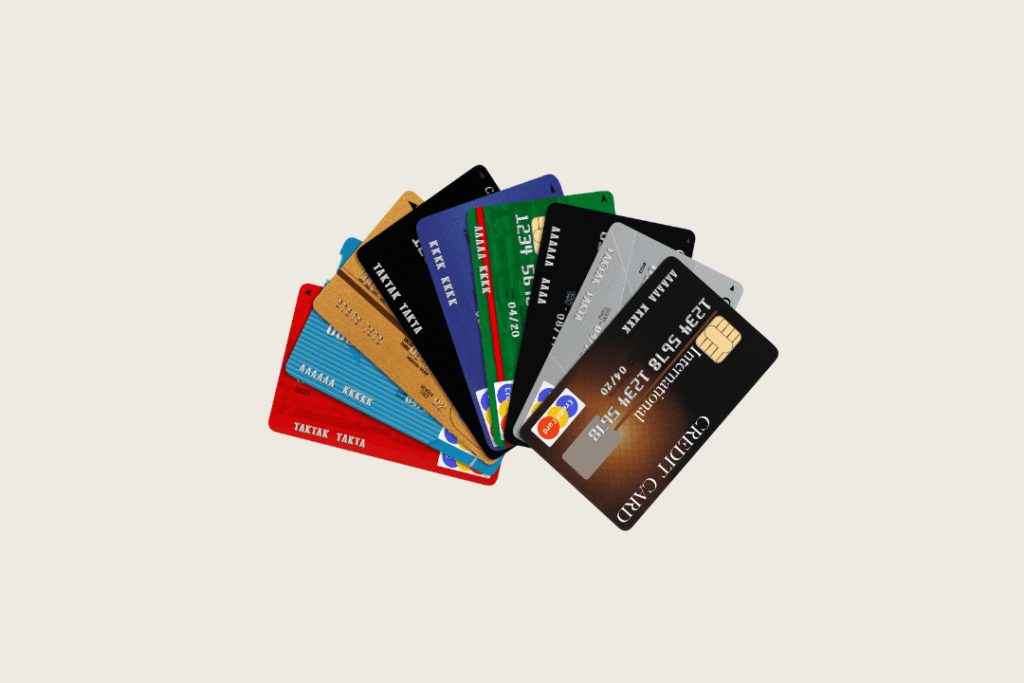
Life without a credit card poses some challenges, yet some people have figured out a way to live without them – those who haven’t usually wonder how many credit cards they should have.
While it is a personal preference, and it does not hurt to have many, there are a few things that you must consider before deciding to apply for your next credit card. Your financial responsibility is one of them.
Table of Contents
What is a Credit Card?
A credit card is a 3.37 by 2.125 plastic or a metal card, or a virtual card stored in a digital wallet that provides a credit line. It gives you purchasing power within the credit limit without carrying cash.
The purchases through a credit card are in the form of credit and can be paid monthly within the due date.
How do Credit Cards Work?
Everyone knows how to use a credit card for payment but have you ever wondered how they work?
What happens behind the scene after every swipe, dip, or tap?
The merchant’s payment gateway receives your card information at checkout, requesting payment from your issue’s bank. After verification of information, the bank authorizes and issues payment to the merchant. This complex process in the background happens instantly.
A credit card works like a personal loan with a due date at the end of every month. Instead of giving you a pile of cash, credit card issuers provide an encrypted 10-digit card that stores payment information.
How Many Credit Cards Should You Have?
The answer to the number of credit cards you should have depends on your financial education and relationship with money. It relies on how good you are at managing money and debt. Too many credit cards can either help or hinder your credit finances and, ultimately, your creditworthiness.
The number of credit cards you want should depend on your financial goals, needs, and personal preference. Based on Experian data in 2020, Americans, on average, hold four credit card accounts, but that does not mean you should also have four credit cards. New Jersian is at the top of the list, whereas Alaskan holds the least.
Ultimately its each credit card holder’s choice, but you should factor in the following scenario while deciding how many credit cards you should have:
# 1 Impulsive Spender

If you’re an impulsive spender and have little or no control over your spending, you might want to try joining the “cash only” group.
According to the Federal Reserve, 83% of Americans carry a credit card, and 50% pay off the card balance monthly. If you fall into the remaining 50%, it’s time to break up with your credit card company. You should join the 17% population who’ve figured out a way to live without plastic money.
The only benefit to an impulsive spender without a credit card is his limited access to money. Spending money any time you want is more accessible with a credit card. Carry cashing for necessary purchases controls impulsive spending.
#2 Average Earner/Spender

The credit card’s cashback value is more important to the average earner/spender than its other benefits or types of rewards. The people in this group are focused more on saving money and limiting expenses. They don’t prefer credit cards with annual fees. Therefore, an everyday credit card and a backup card with no annual fee make more sense to the average earner/spender.
A double cash back card with no annual fee, like a Citi Double Cash Back Card, is preferable. Double cash back is usually an extra benefit you enjoy only with credit cards with an annual fee. Most people settle with a 1-1.5% cash back card.
#3 Big Spender

Big spenders (not necessarily wasteful spending) can use 2X cash or points back for every dollar spent. Even if the card comes with an annual fee, it’s worth swiping them because the cashback earned will always be greater than the annual fee.
In general, a 100 points cashback is usually worth $1. If you spend over $1,000 a month, you’ll receive a minimum of $240 in a year. It covers a basic $100 (or less) annual fee.
A big spender usually carries an additional credit card from a different payment network like American Express, Discover, Mastercard, and Visa. Some merchants like the warehouse establishments like Sam’s Club and Costco only accept visa cards. To take advantage of the savings, you need to carry these cards.
If you have a favorite store where you mostly find your favorite items like dresses, shoes, or personal items, a co-branded store credit card will help you get deals and discounts.
#4 Frequent Traveler

Frequent flyers should definitely consider signing up for travel credit cards. Sticking up to a preferred airline-partnered travel card will work for some, while others may choose general travel cards like capital one Venture or Venture X and Chase sapphire preferred card. It all comes down to the benefit-cost analysis.
Is your cashback higher than the card’s annual fee? Do you have a preferred airline? Or are you looking for benefits like a vacation stay or free room upgrades?
Based on the scenario you can choose between a travel credit card or a co-branded hotel credit card. It makes sense to sign up for a $95 annual fee credit card for some, while others achieve higher benefits with a $650 annual fee card.
Does Applying for A Credit Card Hurt Your Credit?
The credit card approval process goes through applicants’ credit report checks which is a hard inquiry. It will drop your credit score by approximately 5 points. But a new credit application is not the only thing that will bring down the credit score. The other factors that affect your credit score are:
- How timely do you pay your credit balance (payment history),
- What is your credit utilization ratio (above or below 30 percent),
- What is the length of your oldest card,
- What credit mix do you have, and
- If you have any recent new inquiry
Although Applying for a new credit card reduces your credit score due to the hard inquiry, it boosts your credit limit and reduces your utilization rate. Your credit score will eventually go up if you continue the on-time payment on all the cards.
How Many Credit Cards are Too Many?
Interestingly, there is no ceiling for credit cards from when it will start impacting your score. You can have multiple credit cards as you’d like and still be okay. What will hurt your creditworthiness is applying for too many cards during a short period.
Having too many credit cards is cumbersome. The payment dues are difficult to manage, and there is a high probability that you’ll end up getting into credit card debt if you carry a balance every month. Signing up a card for the bonus and dumping it after its intended use can put you on the credit card churning list. Some card issuers can refuse to approve your credit for that reason.
As long as you pay bills on time and you can manage all credit card dues efficiently, having too many credit cards will not hurt you in any way.
Does Closing a Credit Card Hurt Your Credit?
The credit scoring model awards you for maintaining a long credit history with the issuing company. Also, closing a credit card will reduce your available credit limit, which is a negative score on your credit. Therefore, it makes sense to keep your oldest credit card.
But it does not make a big difference if you close your unused credit card as long as you don’t have an outstanding balance. Your score may dip by a few points, but eventually, it will increase if you maintain responsible spending and payment.
Most Credit card issuers will close the account themselves if it remains inactive for over a year.
The Bottom Line
How many credit cards you should have is your personal choice. As long as you make a sound financial decision about how many you want to carry, the number does not make any difference to your credit score.
You have to remember; that with more credit cards, you’d have more bills to keep track of and more due dates to remember. It also means you have a higher credit limit and flexibility to split the expenses.
As long as you’re paying them in full every month and not using credit cards as your means to fulfill your wants, you can enjoy any number of credit cards.




